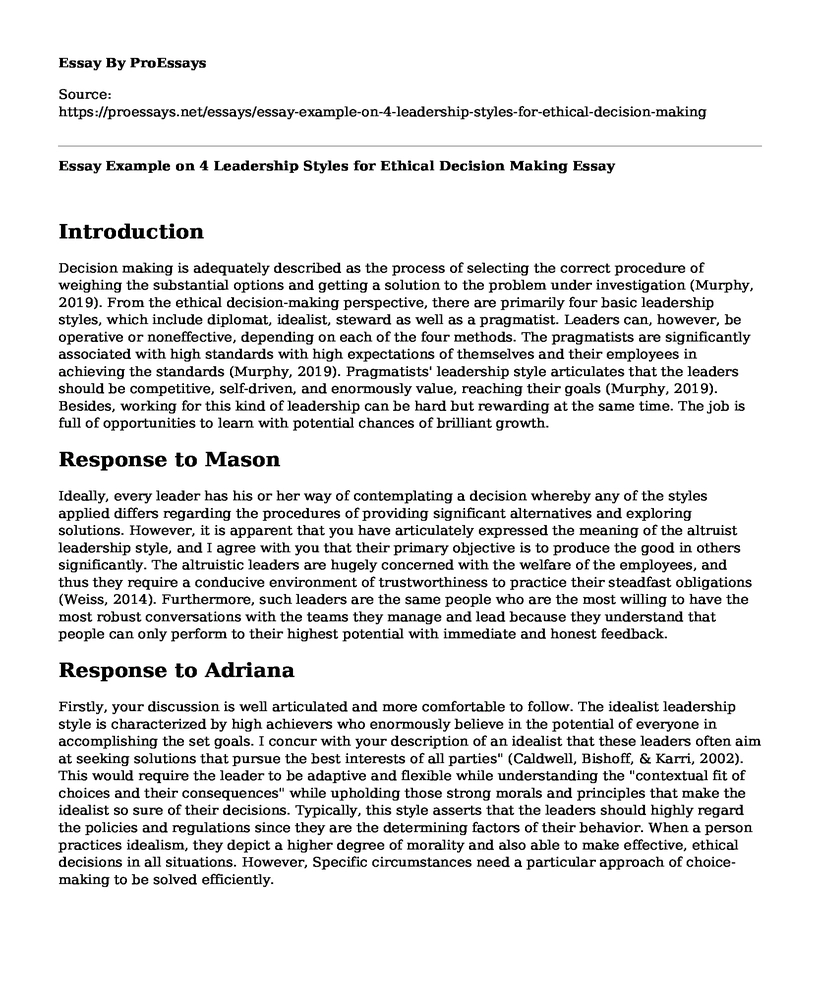Introduction
Decision making is adequately described as the process of selecting the correct procedure of weighing the substantial options and getting a solution to the problem under investigation (Murphy, 2019). From the ethical decision-making perspective, there are primarily four basic leadership styles, which include diplomat, idealist, steward as well as a pragmatist. Leaders can, however, be operative or noneffective, depending on each of the four methods. The pragmatists are significantly associated with high standards with high expectations of themselves and their employees in achieving the standards (Murphy, 2019). Pragmatists' leadership style articulates that the leaders should be competitive, self-driven, and enormously value, reaching their goals (Murphy, 2019). Besides, working for this kind of leadership can be hard but rewarding at the same time. The job is full of opportunities to learn with potential chances of brilliant growth.
Response to Mason
Ideally, every leader has his or her way of contemplating a decision whereby any of the styles applied differs regarding the procedures of providing significant alternatives and exploring solutions. However, it is apparent that you have articulately expressed the meaning of the altruist leadership style, and I agree with you that their primary objective is to produce the good in others significantly. The altruistic leaders are hugely concerned with the welfare of the employees, and thus they require a conducive environment of trustworthiness to practice their steadfast obligations (Weiss, 2014). Furthermore, such leaders are the same people who are the most willing to have the most robust conversations with the teams they manage and lead because they understand that people can only perform to their highest potential with immediate and honest feedback.
Response to Adriana
Firstly, your discussion is well articulated and more comfortable to follow. The idealist leadership style is characterized by high achievers who enormously believe in the potential of everyone in accomplishing the set goals. I concur with your description of an idealist that these leaders often aim at seeking solutions that pursue the best interests of all parties" (Caldwell, Bishoff, & Karri, 2002). This would require the leader to be adaptive and flexible while understanding the "contextual fit of choices and their consequences" while upholding those strong morals and principles that make the idealist so sure of their decisions. Typically, this style asserts that the leaders should highly regard the policies and regulations since they are the determining factors of their behavior. When a person practices idealism, they depict a higher degree of morality and also able to make effective, ethical decisions in all situations. However, Specific circumstances need a particular approach of choice-making to be solved efficiently.
References
Caldwell, C., Bischoff, S. J., & Karri, R. (2002). The Four Empires: A Paradigm for Ethical Leadership. Journal of Business Ethics, 36(1/2), 153. Retrieved from https://search-ebscohost-com.ezproxy.snhu.edu/login.aspx?direct=true&db=edb&AN=12149961&site=eds-live&scope=site
Murphy, M. (2019). "Leadership Styles" Leadershippiq.com. Retrieved from https://www.leadershipiq.com/blogs/leadershipiq/36533569-quiz-whats-your-leadership-style
Weiss, J. W. (2014). Business Ethics: A Stakeholder and Issues Management Approach (Vol. Sixth edition). San Francisco: Berrett-Koehler Publishers. Retrieved from https://search-ebscohost-com.ezproxy.snhu.edu/login.aspx?direct=true&db=nlebk&AN=667095&site=eds-live&scope=site
Cite this page
Essay Example on 4 Leadership Styles for Ethical Decision Making. (2023, Mar 28). Retrieved from https://proessays.net/essays/essay-example-on-4-leadership-styles-for-ethical-decision-making
If you are the original author of this essay and no longer wish to have it published on the ProEssays website, please click below to request its removal:
- Leadership Issues in Uganda Paper Example
- Essay Sample on Project Management for JCDecaux: Improving the City of Lyon
- Risk Mitigation Through Employee Insurance: RBC Analysis - Essay Sample
- Essay on Organizational Behavior: Micro, Meso & Macro-Levels Impacting Human Conduct
- Stock Market Forecasting: Key to Risk Management and Trader Success - Essay Sample
- The Power of Leadership: Impacting Followers and Organizations - Essay Sample
- Organizational Culture at Tesla - Report Sample







